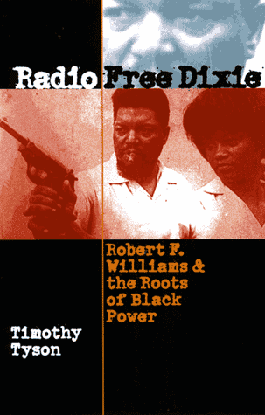 Tyson, Timothy B. Radio Free Dixie: Robert F. Williams and the Roots of Black Power.
Chapel Hill: University of North Carolina Press, 1999.
Tyson, Timothy B. Radio Free Dixie: Robert F. Williams and the Roots of Black Power.
Chapel Hill: University of North Carolina Press, 1999.
The following is from the inside jacket cover of
Radio Free Dixie: Robert F. Williams and the Roots of Black Power:
Radio Free Dixie is the remarkable story of Robert F. Williams — one of
the most influential black activists of the generation that toppled Jim Crow, created a
new black sense of self, and forever altered the arc of American history. In the late
1950s, as president of the Monroe, North Carolina, branch of the NAACP, Williams and
his followers used machine guns, dynamite, and Molotov cocktails to confront Klan
terrorists. Advocating "armed self-reliance" by black Southerners, Williams
challenged not only white supremacists but also Martin Luther King Jr. and the civil
rights establishment. Forced to flee during the 1960s to Cuba — where he broadcast
"Radio Free Dixie," a program of black politics and music that could be heard
as far away as Los Angeles and New York City — and then China, Williams remained
a controversial figure for the rest of his life. "Robert Williams was just a
couple of years ahead of his time," Malcolm X said in 1964, "but he laid a
good groundwork, and he will be given credit in history for the stand he took."
In fact, though his defiance of racist terrorism was dramatic, Williams was typical of
many black Southerners in his determination to protect home and family by any means
necessary. Televised images of peaceful protesters braving white mobs captured the moral
imagination of the world, but for most black Southerners, nonviolent direct action made
sense only when the Cold War world was watching. On the back roads of the civil
rights-era South, black Southerners — Dr. King, Thurgood Marshall, Daisy Bates,
and Medgar Evers among them — kept guns or guards close at hand. The problem
was not so much that Williams practiced self-defense as that he preached it,
broadcasting his vision across the world, inspiring the Black Panthers and a generation
of Black Power militants.
Radio Free Dixie goes beyond the television cameras and civil rights celebrities
to the roots of the freedom struggle in the rural black South. It connects the American
South to an entire world torn by Cold War conflict. It shows how black Southerners used
the global contest between the superpowers as leverage for their own liberation.
Radio Free Dixie explores the volatile sexual subtext of the Southern struggle.
And it attests to the fact that, long before anyone changed "Black Power,"
virtually all of the elements that we associate with that slogan were present in the
small towns and rural communities of the South where the freedom movement was born.
The story of Robert F. Williams shows that independent black politics, black cultural
pride, and "armed self-reliance" operated in tension and in tandem with legal
efforts and nonviolent protests. Radio Free Dixie reveals that both the civil
rights movement and the Black Power movement, often portrayed in clashing terms, grew
out of the same soil, confronted the same predicaments, and reflected the same quest
for African freedom.
Timothy B. Tyson is assistant professor of Afro-American studies at
the University of Wisconsin-Madison.
The following is from the back cover of Radio Free Dixie: Robert F. Williams and
the Roots of Black Power:
"A compelling story that needed to be told and now needs to be read by all who care
about race, courage, and humanity. Robert Williams was an inspiration to many and a threat
to others; Tyson gives him his proper due." — JULIAN BOND
"Tyson's insightful and provocative study of Robert F. Williams's militant resistance
to white supremacy is at once complex and straightforward, and yet always profoundly moving.
This is an important book." — DARLENE CLARK HINE, Michigan State University
"A monumental book. It is impossible to conceive of the postwar black freedom
struggle without Robert Williams. And yet, most histories barely mention the man.
Timothy Tyson's profound biography rewrites the history of the African American struggle
for democracy, unearthing its most militant streams and revealing its deep relationship
to revolutions around the world." — ROBIN D. G. KELLEY, New York University
"A spellbinding narrative that analyzes the making of black manhood in an era
that bridged Jim Crow and civil rights. Through the life of Robert Williams, Tyson
provides a stunning reappraisal of non-violence as a civil rights strategy, putting gender
and class at its center.... And he gives us a hero. Robert Williams is a giant abroad
in the land of Jesse Helms." — GLENDA E. GILMORE, Yale University
"A valuable and needed addition to the literature of the modern African American
freedom struggle.... Tyson has ably and vividly supplied the missing chapters of
Williams's remarkable odyssey as an agitator in the South and fugitive rebel in the
Third World." — CLAYBORNE CARSON, director, Martin Luther King Jr. Papers Project

|

